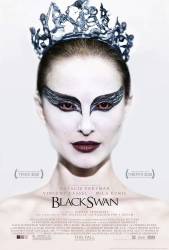Visible crew/equipment: In the scene when Nina arrives to her home after she knew she was chosen, she is looking for her mom (who bought a cake for Nina), and there is a camera man in a mirror.

Black Swan (2010)
1 visible crew/equipment mistake
Directed by: Darren Aronofsky
Starring: Winona Ryder, Natalie Portman, Mila Kunis, Vincent Cassel, Barbara Hershey
Factual error: In the scene where Natalie Portman travels from her house to Lincoln Center she is riding the 1 subway train. The model train shown is a R142, which only serves the 2,4,5 trains. The one 1 train line is actually served by the R62A.
Erica: What happened to my sweet girl?
Nina: She's gone!
Trivia: Despite her prominent billing, Winona Ryder has only four minutes of screen time.
Question: I didn't understand the movie. Was it all a metaphor for her descent into madness? And the ending. How much of the movie was imagined and how much was actually real?
Join the mailing list
Separate from membership, this is to get updates about mistakes in recent releases. Addresses are not passed on to any third party, and are used solely for direct communication from this site. You can unsubscribe at any time.
Check out the mistake & trivia books, on Kindle and in paperback.




Answer: **Spoiler Alert** I would say you are correct about the movie being a metaphor for descent into madness, but also displays themes of repressed sexuality and transformation. As the main character is given the lead role, she must play dual roles, one good and one evil, with the hallucinations representing the latter. Towards the beginning, Nina only embodies the personality traits of the white swan, innocence and grace. As the film gradually progresses, Ninas hallucinations represent her metamorphosis into the seductive and mysterious black swan. The film expertly convinces the audience that Lily (Mila Kunis) is out for Nina's role. In a twist ending, it is revealed that Nina has imagined most of her encounters with lily (including their sexual one) and has instead been battling herself, such as breaking away from her domineering mother and coming to terms with her sexuality. At the end, Nina really does stab herself (but actually hallucinates it is Lily she is stabbing) and her fate is left ambiguous.